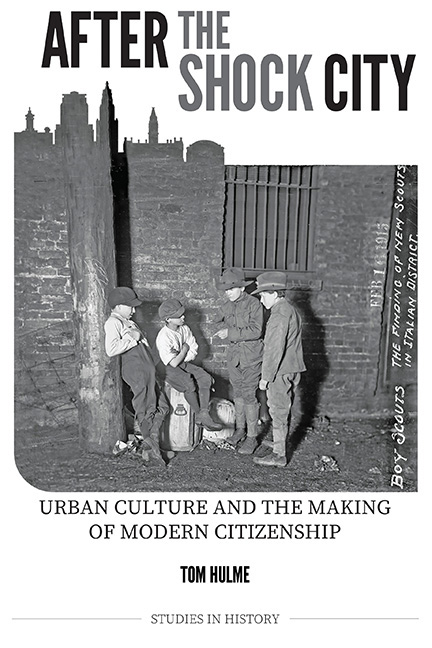Book contents
- Frontmatter
- Dedication
- Contents
- List of figures
- Acknowledgements
- Abbreviations
- Introduction: after the shock city
- 1 Citizenship and the Interwar City
- 2 Urban Utopias and Education
- 3 Celebrating the City
- 4 History, Progress and Community Performance
- 5 The Citizen of Tomorrow
- 6 Civic Culture and Welfare
- Conclusion: after the citizenship city
- Bibliography
- Index
1 - Citizenship and the Interwar City
Published online by Cambridge University Press: 03 September 2019
- Frontmatter
- Dedication
- Contents
- List of figures
- Acknowledgements
- Abbreviations
- Introduction: after the shock city
- 1 Citizenship and the Interwar City
- 2 Urban Utopias and Education
- 3 Celebrating the City
- 4 History, Progress and Community Performance
- 5 The Citizen of Tomorrow
- 6 Civic Culture and Welfare
- Conclusion: after the citizenship city
- Bibliography
- Index
Summary
Britain and the US had clearly urbanised by the turn of the twentieth century, and towns and cities continued to grow into the interwar decades. It is generally accepted that landscape, culture, politics and daily life was consequently transformed – and that cities were both ‘exemplars of a changing order and also engines for the creation of that order’. Until now, however, the question of the specifically urban aspects of citizenship have been somewhat underplayed. Cities were getting bigger, more numerous and setting the agenda in terms of politics and governance, yet questions of belonging and civic identity, the prevailing historiography suggests, were supposedly becoming less important or apparent by the end of the nineteenth century. This chapter outlines, explains and critiques this seeming paradox, and offers an alternative: that the city still had an important role to play in the theories and practices of citizenship right into the 1930s.
To achieve this rethinking I take a long perspective. I begin by tracing how historians have emphasised the political and legal definitions of citizenship. Britain and the US experienced similar developments in the nineteenth and early twentieth centuries that shaped the articulation and response to societal questions: the creation of a mass electorate, changing fortunes in global power, the growth of the state and internal challenges to the social and political order. I then turn to the place of the ‘shock city’, and the urban more broadly, in late nineteenth-century understandings of citizenship. Reacting against urban degeneration in the industrial city, and fearing the decline of society and national power, civic reformers and municipal governments increasingly intervened to shape a better (if still hierarchical) local community. Rather than following historians who have seen the decline of urban solutions in the interwar period, however, I emphasise continuity. Progressivism may have faltered in the US by 1920, British cities might have continued to lose civic leaders to the suburbs, and political debate and practice did partially move to the national in both countries. But cities were still, nevertheless, conceptualised as a key site of community building. This opinion is tracked across a range of thinkers on urban life in the 1920s and 1930s. Urban critique, in comparison to the often-shrill denunciations and predictions of the 1880s and 1890s, now softened.
- Type
- Chapter
- Information
- After the Shock CityUrban Culture and the Making of Modern Citizenship, pp. 18 - 46Publisher: Boydell & BrewerPrint publication year: 2019

